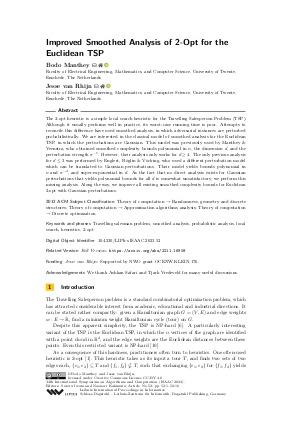@InProceedings{manthey_et_al:LIPIcs.ISAAC.2023.52,
author = {Manthey, Bodo and van Rhijn, Jesse},
title = {{Improved Smoothed Analysis of 2-Opt for the Euclidean TSP}},
booktitle = {34th International Symposium on Algorithms and Computation (ISAAC 2023)},
pages = {52:1--52:16},
series = {Leibniz International Proceedings in Informatics (LIPIcs)},
ISBN = {978-3-95977-289-1},
ISSN = {1868-8969},
year = {2023},
volume = {283},
editor = {Iwata, Satoru and Kakimura, Naonori},
publisher = {Schloss Dagstuhl -- Leibniz-Zentrum f{\"u}r Informatik},
address = {Dagstuhl, Germany},
URL = {https://drops.dagstuhl.de/entities/document/10.4230/LIPIcs.ISAAC.2023.52},
URN = {urn:nbn:de:0030-drops-193549},
doi = {10.4230/LIPIcs.ISAAC.2023.52},
annote = {Keywords: Travelling salesman problem, smoothed analysis, probabilistic analysis, local search, heuristics, 2-opt}
}

 Creative Commons Attribution 4.0 International license
Creative Commons Attribution 4.0 International license
